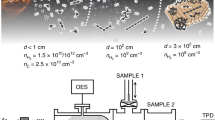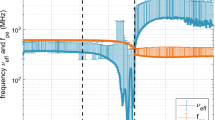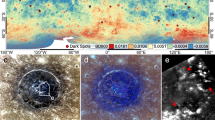Abstract
IN the introduction a few remarks are made on the growing interest in everything connected with dust, whether it be the organic germs floating in the air, or the inorganic particles that pollute our atmosphere. Prof. Tyndall's observations on the dark plane seen over a hot wire2 are referred to, Lord Ray-leigh's recent discovery of the dark plane formed under a cold body3 is described, and attention called to Dr. Lodge's experiments described in a letter to NATURE, vol. xxviii. p. 297.
This is a preview of subscription content, access via your institution
Access options
Subscribe to this journal
Receive 51 print issues and online access
$199.00 per year
only $3.90 per issue
Buy this article
- Purchase on Springer Link
- Instant access to full article PDF
Prices may be subject to local taxes which are calculated during checkout
Similar content being viewed by others
References
Abstract of a paper read to the Royal Society of Edinburgh, January 21, 1884, by Mr. John Aitken.
"Essays on the Floating-Matter in the Air," p. 5. (Longmans, Green, and Co., 1881.)
NATURE, vol. xxviii., p. 139.
Rights and permissions
About this article
Cite this article
The Formation of Small Clear Spaces in Dusty Air 1 . Nature 29, 322–324 (1884). https://doi.org/10.1038/029322a0
Issue Date:
DOI: https://doi.org/10.1038/029322a0
Comments
By submitting a comment you agree to abide by our Terms and Community Guidelines. If you find something abusive or that does not comply with our terms or guidelines please flag it as inappropriate.



